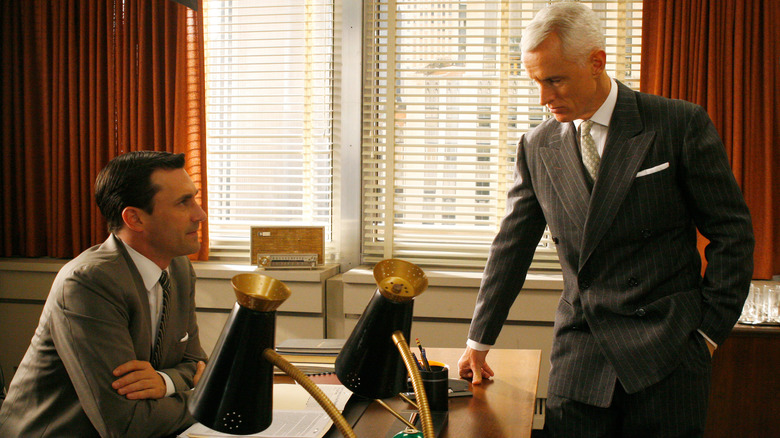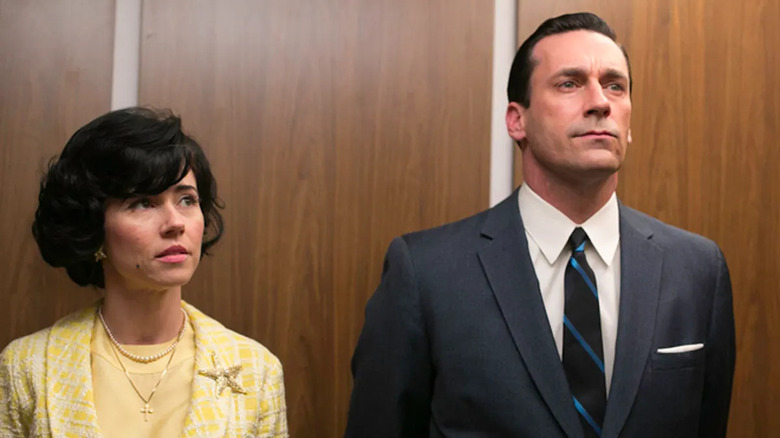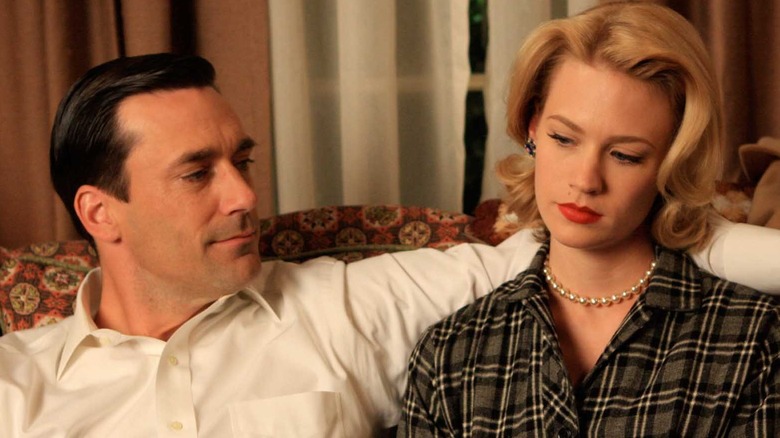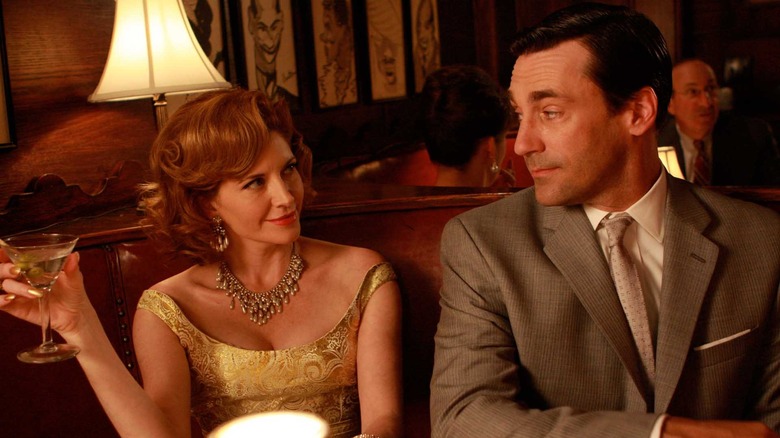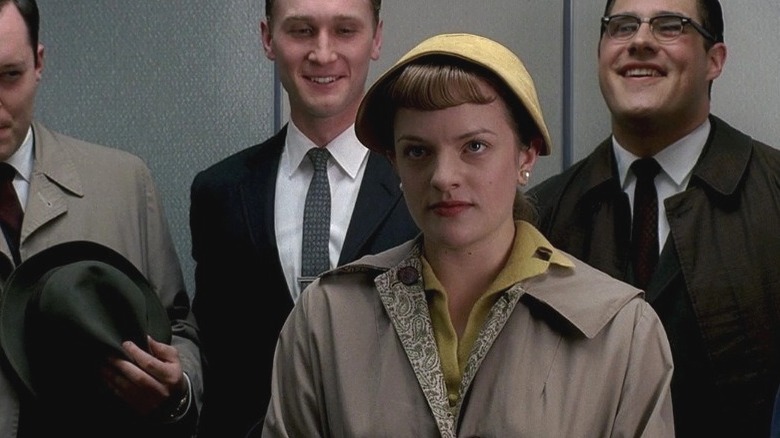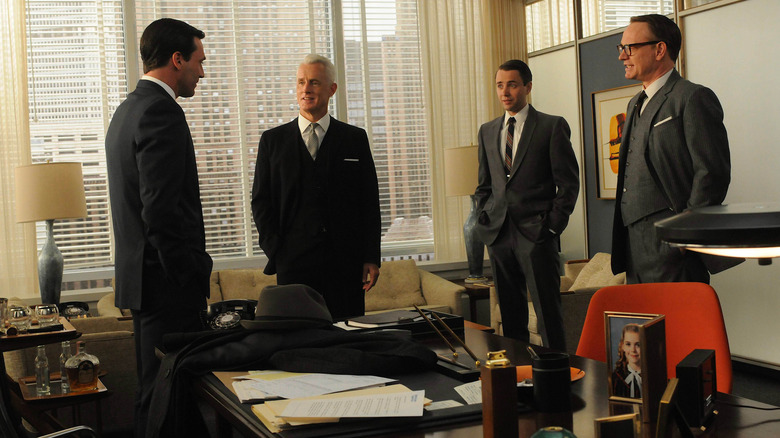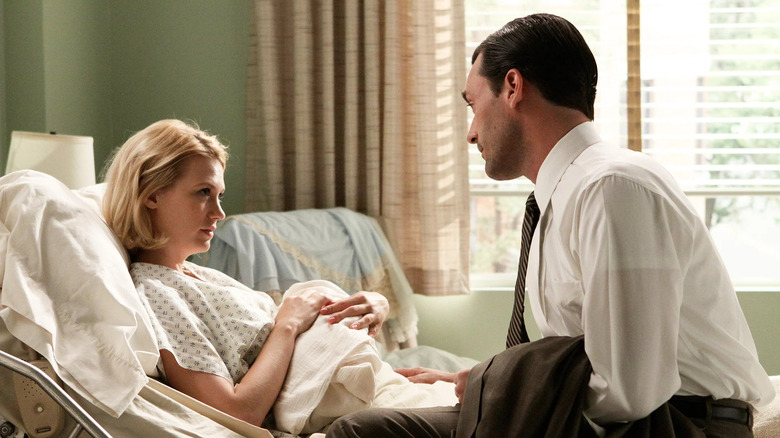Every Season Of Mad Men Ranked Worst To Best
"Advertising is based on one thing: happiness," says Don Draper (Jon Hamm) in the first episode of "Mad Men." Is there a better way to learn about people than observing what they buy? "Mad Men" explored the emerging trends in the advertising industry throughout the 1960s and served as a great history lesson on the social, political, and economic changes in America during this critical decade of progress.
"Mad Men" follows the fictional lives of employees working at the Sterling Cooper advertising company. Don Draper is a creative director and junior partner at the firm. Although Don seems to be the most charismatic man in any room he walks into, tragedy plagues his life. The series slowly unveils how traumatic incidents in Don's past shaped who he became. Although the series features a great ensemble of characters, "Mad Men" ultimately asks: "Who is Don Draper?"
Throughout its run on AMC, "Mad Men" gained showering praise – earning four consecutive Emmy Awards for best drama series. While some great shows tend to run out of steam toward their end, "Mad Men" stayed consistently strong throughout its entire run. If you haven't watched "Mad Men" yet, don't worry, the ending won't be a disappointment! The "Mad Men" series finale, "Person to Person," gave a satisfying resolution to all of the show's character arcs. Here is every season of "Mad Men" ranked worst to best.
7. Season 6
Season 6 of "Mad Men" is not bad by any stretch of the imagination, but it's easily the least compelling. The show began setting up story arcs that would pay off in the final season, so season 6 ends on a fairly downbeat note. Don's marriage to Megan (Jessica Paré) is crumbling, and Peggy Olson's (Elisabeth Moss) future is uncertain. While Peggy enjoyed her relationship with Ted Chaough (Kevin Rahm), Ted chose to move to Los Angeles to reconnect with his family and work at a different branch of the company.
Some of the recurring story arcs in Season 6 are underwhelming. Don has an extended affair with his neighbor, Sylvia Rosen (Linda Cardellini), which his daughter Sally (Kiernan Shipka) ultimately discovers. Don has always been a complex character, but this new infidelity makes him straight-up unlikeable. That being said, Cardellini gives a terrific performance.
There is also a lot of time dedicated to the character Jim Cutler (Harry Hamlin) in season 6. Jim is one of the partners at the new firm Sterling Cooper & Partners after Sterling Cooper Draper Pryce merged with their former rival, Cutler Gleason Chaough. Jim is a constant thorn in the side of Don, Roger Sterling (John Slattery), Pete Campbell (Vincent Kartheiser), and Bert Cooper (Robert Morse). Although Jim is a necessary antagonist, he pales in comparison to previous seasons' villains — such as Duck Phillips (Mark Moses). Also, he's simply unpleasant.
6. Season 2
After the stellar first season of "Mad Men," season 2 has a hard time living up to fans' high expectations. While it's an engaging season of television, season 2 lacked the "newness" that season 1 had. However, there are still some great storylines. After giving birth to Pete's child at the end of season 1, Peggy grows into her role as a copywriter. She battles systematic oppression in Sterling Cooper's hostile working environment. Pete becomes more mature too. After professing his love to Peggy, Pete realizes he missed his chance to marry her.
"Mad Men" grew more experimental in season 2. The episode "The Jet Set" is a self-contained, somewhat dreamlike journey into Don's quest for happiness. After Don's suitcase goes missing during a business trip to Los Angeles, Don luxuriates at a hotel. He begins a relationship with the young woman Joy (Laura Ramsey), who belongs to a social group of rich nomads. During their passionate affair, Joy asks Don: "Why would you deny yourself something you want?" Perhaps, this was the show's way of asking why Don has always denied himself "joy" itself. Joy represents everything that Don desires: she loves him without question, but doesn't ask for him to commit to anything. Season 2 ends with a compelling cliffhanger. Don's wife, Betty (January Jones), reveals to him that she is pregnant in the last episode, "Meditations in an Emergency," posing the question: "Is Don ready for the responsibility?"
5. Season 5
Following Don's marriage to Megan at the end of season 4, he learns he will never truly be able to commit to anyone. It's a very dark theme and season 5 goes to some very disturbing places as Sterling Cooper Draper Pryce struggles to carve a new identity for itself as a company. Also, there are many important moments of development for the show's main characters. Roger acknowledges he is no longer a young man in the episode "Far Away Places." Peggy leaves the firm to join Cutler Gleason Chaough. Pete has an affair with Beth Dawes (Alexis Bledel), and Sally learns that her father used to be married to Anna Draper (Melinda Page Hamilton).
Season 5 of "Mad Men" notably includes the death of Lane Pryce (Jared Harris). Lane discovers he is in danger of being deported to England, so he forges a check under Don's name. When Lane's theft is discovered by the other senior partners, he spirals into depression. Lane dies by suicide in the episode "Commissions and Fees." It's a heartbreaking moment, particularly for Joan Harris (Christina Hendricks). During Joan's divorce from her husband, Greg (Samuel Page), she confided in Lane.
"The Phantom" episode provides a great ending for season 5. Megan receives an opportunity to act in a commercial. After watching his wife on set, Don walks away to the song "You Only Live Twice." Don really is living two lives — one as Dick Whitman and one as Don Draper.
4. Season 7
The final season of "Mad Men" aired in two parts subtitled "The Beginning" and "The End of an Era." On its own merits, "The End of an Era" section of episodes includes enough stand-out moments to rank at the top of this list. While "The Beginning" is still good, it's mostly setting up what's to come. "The Beginning" focuses on Sterling Cooper & Partners becoming an independent subsidiary of the advertising agency network McCann Erickson. There is a touching scene at the end of "The Strategy" where Don, Pete, and Peggy share a meal together. It's amazing to think about how much these characters have changed since their initial introductions. The next episode, "Waterloo," incorporates a wonderful musical sequence that serves as a great send-off for Bert, who dies after watching the televised "Apollo 11" moon landing.
In "The End of an Era," the show's characters adjust to the new reality of the 1970s. The series finale, "Person to Person," sets up new journeys for everyone. Pete rekindled his relationship with his wife, Trudy (Alison Brie). Joan begins an independent business. Peggy acknowledges her love for her co-worker, Stan Rizzo (Jay R. Ferguson), and Roger finds a relationship he can commit to with Megan's mother, Marie Calvet (Julia Ormond). During the ending of "Mad Men," Don meditates with a hippie commune. He smiles, and the show implies that after this moment, he'll go on to create the iconic 1971 Coca-Cola "Hilltop" ad.
3. Season 1
Some television shows struggle to craft an identity in their initial season, but "Mad Men" knew what it wanted to be in its first episode. In the "Mad Men" pilot, "Smoke Gets in Your Eyes," the show depicts its lead characters' defining characteristics. Don is a serial womanizer hiding from his past: as a result, he's unable to be completely honest with anyone. Pete is highly ambitious, but his overconfidence tends to get him into trouble. Peggy is determined to succeed despite the advertising industry's constant sexism. She's willing to silence her doubters.
Also, season 1 does a great job at incorporating historical events into its fictional storyline. The U.S. presidential election between John F. Kennedy and Richard Nixon serves as the backdrop for the show's climactic penultimate episode, where Pete discovers Don has been lying about his identity. Don grew up under the name Dick Whitman, but took the last name Draper from his Lieutenant in the Korean War. It's not Don's only reminder of his past. His brother, Adam (Jay Paulson), reaches out to him. Don pays him off, asking him to never contact him again.
The season 1 finale, "The Wheel," summarizes the show's themes on family and consumerism with Don's pitch to Kodak. Don dubs their new projector "The Carousel" and gives a moving speech about the importance of memory. Don incorporates images from his family's collection within the photo reel. "It takes us to a place where we ache to go again," he says.
2. Season 4
Season 4 started an exciting new era for the show. Not only had Sterling Cooper become the independent agency Sterling Cooper Draper Pryce, but Don officially separated from Betty. This season shows the perils of Don's new independence. Although Don has many romantic entanglements, he ultimately marries Megan in the final episode, "Tomorrowland." Don has been happy with Megan, and sees that she is great with children. However, the impromptu nature of Don's proposal foreshadows another challenging breakup in his future.
Season 4 includes the best episode of the series, "The Suitcase." Don is dreading a phone call from Anna's niece, Stephanie (Caity Lotz). Anna is dying of cancer, and Don does not want to hear the confirmation of her death. He forces Peggy to stay at the office, and they connect. For the first time, Don begins to see Peggy as his equal. After receiving the call from Stephanie, Don breaks down in tears in front of Peggy. It is among the most moving moments in the entire series.
Roger and Joan go through some significant character development in season 4. Roger loses the Lucky Strikes account, which puts the firm's finances in serious danger. He struggles to admit his failure to the other partners. Although Roger fails to rekindle his relationship with Joan, she becomes pregnant with his child. Roger offers to pay for an abortion, but Joan decides to pass off the child as a legitimate offspring with her husband, Greg.
1. Season 3
Season 3 shows "Mad Men" at its most exciting point. The world of advertising is incisive, leading to many fast and shocking workplace decisions. Season 3 saw the formation of a new firm, the arrival of a beloved character, the darkest joke in the history of "Mad Men," and Don's breakup with Betty.
Sterling Cooper struggles with financial concerns. McCann Erickson plans to purchase the British advertising agency Puttnam, Powell, and Lowe, which merged with Sterling Cooper at the end of season 2. PPL's executive, Lane, grows fond of the Sterling Cooper employees during his time in America. In the season finale, "Shut the Door. Have A Seat," Don, Bert, Roger, and Lane pull off an exciting scheme to create an independent agency. Lane added a fun new dynamic to the series. Jed Harris' excellent performance is one of the season's highlights.
Notably, season 3 took on tonal risks, including a disturbing moment in "Guy Walks Into an Advertising Agency" when the PPL executive Guy MacKendrick (Jamie Thomas King) gets injured during a workplace accident. Although the moment is played for laughs, Guy's ruined career nags at Don.
Don and Betty's marriage has been "rocky" — to put it mildly. But season 3 shows Betty finally deciding she wants a divorce. She's grown tired of Don's affairs, even if he attempts to pin her decision on mental issues. This moment sets Don off on a new path and forces Sally to become more independent.
